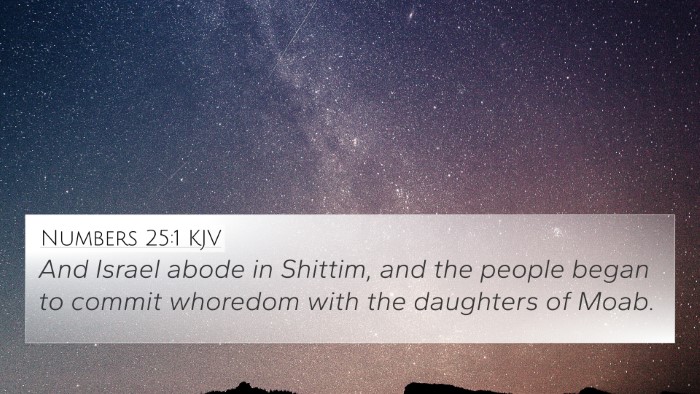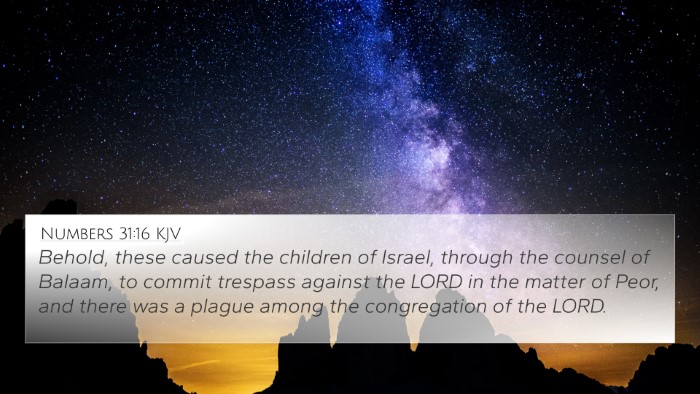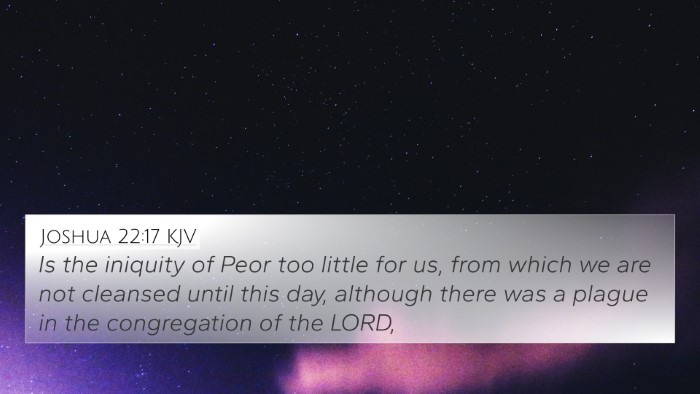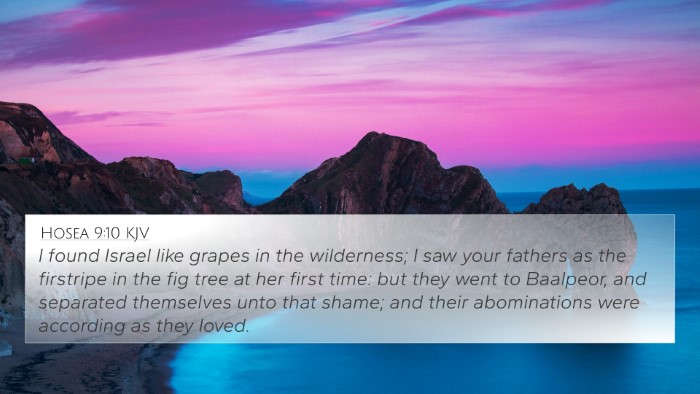Understanding Deuteronomy 4:3
Verse: Deuteronomy 4:3 - "Your eyes have seen what the LORD did at Baal Peor; for all the men that followed Baal Peor, the LORD thy God hath destroyed them from among you."
Summary of Meaning
This verse serves as a solemn reminder to the Israelites regarding the consequences of idolatry. It emphasizes the importance of fidelity to God, recalling the judgment that befell those who turned away to worship Baal Peor. By linking this event, the author aims to reinforce the need for loyalty to the covenant with God, highlighting His sovereignty and justice.
Commentary Insights
Matthew Henry’s Commentary
Matthew Henry emphasizes that this verse serves as a warning, underlining how those who are unfaithful to God will face dire consequences. He elucidates the notion that God actively punishes idolatry, which is a violation of the covenant relationship. The destruction of those who followed Baal Peor illustrates not only God's judgment but also His mercy towards the faithful remnant.
Albert Barnes’ Commentary
Albert Barnes provides a detailed account of the events at Baal Peor, stressing the importance for Israel to remember their history to avoid repeating the same mistakes. He draws attention to the need for obedience and warns that neglecting God's commandments could lead to similar destruction. Barnes accentuates that the remembrance of God's past actions serves to strengthen faith in His promises.
Adam Clarke’s Commentary
Adam Clarke focuses on the historical context of Baal Peor, indicating its significance in the narrative of Israel's journey. He reinforces the idea of divine retribution for idolatry, along with the call for Israel to distinguish itself from surrounding nations by adhering to the true worship of God. Clarke also explores the concept of spiritual fidelity as essential to receiving God’s blessings.
Bible Verse Cross-References
- Numbers 25:1-5: Describes the events at Baal Peor and the consequences of Israel’s unfaithfulness.
- Exodus 20:3-5: Commandment against idolatry, emphasizing God's exclusivity.
- Deuteronomy 6:15: Warns against provoking God's anger through idolatry.
- Joshua 23:15-16: A reminder of the consequences of forsaking the covenant with God.
- Romans 1:24-25: The New Testament parallel discussing the consequences of idolatry in human behavior.
- 1 Corinthians 10:8: Refers back to the incident, urging Christians to flee from idolatrous practices.
- Hebrews 3:12-14: A caution against having an evil heart of unbelief, likened to Israel's history.
Thematic Connections between Bible Verses
In addition to the direct cross-references, Deuteronomy 4:3 can be linked to several thematic elements throughout the Scriptures:
- Faithfulness to God: This theme resonates through various books, challenging believers to remain steadfast in their commitment (see James 1:12).
- Consequences of Sin: The outcomes of sin and rebellion against God can be tracked from the Old Testament through to the New Testament (linking Galatians 6:7).
- The Nature of Idolatry: The dangers of turning to false gods, which is an ongoing thread in the prophetic writings and epistles (see 1 John 5:21).
Comparative Bible Verse Analysis
Through comparative study, one can observe that Deuteronomy 4:3 is representative of the broader narrative concerning Israel's relationship with God and their history of turning to idolatry. The analysis of related verses leads to a deeper understanding of God’s character and His expectations of His people.
Tools for Bible Cross-Referencing
Utilizing a Bible concordance or cross-reference guide can enhance one’s study by uncovering additional verses that illustrate shared themes and lessons. Methods involving cross-referencing and analyzing thematic connections offer deeper insight into scriptural meanings.
Inter-Biblical Dialogue
Deuteronomy 4:3 engages in an inter-Biblical dialogue with various texts, illustrating the continuity of God’s character and the interconnectedness of biblical themes. Understanding such connections enriches one's comprehension of scripture and God's overarching plan for humanity.
Conclusion
In understanding Deuteronomy 4:3, the reader is called not only to remember the lessons of the past but also to actively engage in a faith that resists the temptation of idolatry, remaining loyal to the God who has saved and called His people. Cross-referencing such themes reveals how intertwined and instructive God's word truly is.








